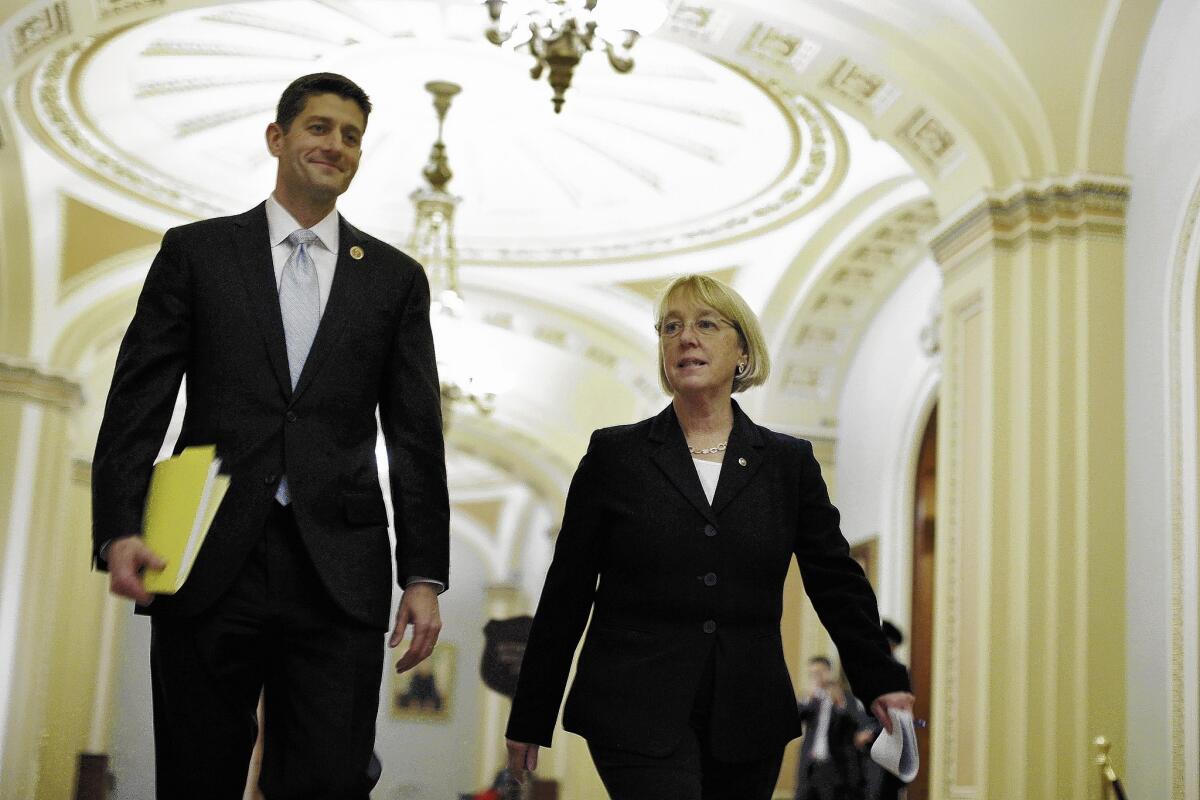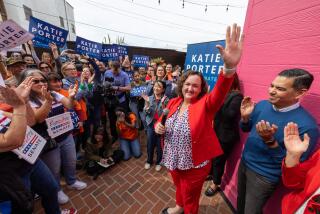A low-key senator, a budget breakthrough

WASHINGTON — That Congress could soon pass a budget agreement after months of relentless partisan showdowns is thanks in large part to a mom in tennis shoes.
Sen. Patty Murray presented herself in that ordinary way when she first ran as a Democrat to represent Washington state, and skeptics questioned her political savvy — and footwear. In the two decades since that long-shot campaign, the petite, no-nonsense lawmaker has quietly ascended to the top levels of Senate power.
As chairwoman of the Budget Committee, Murray negotiated a breakthrough $85-billion accord in one-on-one talks with Rep. Paul D. Ryan, the former GOP vice presidential contender from Wisconsin who is known for his austere approach to the federal budget.
FOR THE RECORD:
Patty Murray: In the Dec. 15 Section A, an article profiling Sen. Patty Murray (D-Wash.) and her leading role in negotiating a budget accord in Congress said that she had previously led the Senate’s Democratic majority to approve the chamber’s first budget without dissenting votes in four years. Four Democrats voted no. —
The deal she and Ryan sealed with a private handshake — after President Obama, Speaker John A. Boehner (R-Ohio) and others all failed — adds a significant achievement to what has become a formidable political career. The House resoundingly approved it Thursday, and the Senate is expected to pass it in the coming week, greatly reducing the risk of a federal government shutdown next year.
Her role also provides a reminder of the growing clout of women in the Senate, who numbered three when she first ran for office. There are now 20. Murray is the first woman to head the Senate Budget Committee, and almost half of the chamber’s committee chairmen are, in fact, now women.
PHOTOS: The battle over Obamacare
“She is now 9 feet tall, not 5 feet tall,” said Sen. Joe Manchin III (D-W.Va.), who is inclined to support the package. “She never lost her cool through all of it — pretty amazing.”
Murray’s success in crafting the budget deal was not without early stumbles.
She was tapped by Senate Majority Leader Harry Reid (D-Nev.) two years ago to head a “supercommittee” of senators and representatives to forge a budget accord, but her team was unable to do so. Republicans refused to raise taxes; Democrats resisted cuts to safety net programs.
Drawing on those lessons, Murray, a determined politician, pushed on. She earned the trust of skeptical Democrats who were wary of dealing with the new class of tea party Republicans. Her history of taking jobs no one wanted helped. She headed her party’s Senate campaign committee in 2012, when Reid couldn’t find anyone else to do the work, and Democrats bolstered their majority against long odds.
This year, Murray corralled the Senate’s Democratic majority to approve the chamber’s first budget in four years without dissenting votes, setting the stage for her deal with Ryan.
Sen. Barbara A. Mikulski (D-Md.), the dean among the Senate’s women, has watched what she called Murray’s “unique negotiating style” of sticking to her goals but building consensus among her peers.
“She carried the football from one first down after another to get it across the goal,” Mikulski said.
Murray and Ryan met for breakfast with other budget committee lawmakers in the Capitol the morning after the government reopened in October following the 16-day shutdown.
Over pastries and coffee, the two agreed not to seek the kind of far-reaching deal that had eluded Obama and Boehner. Instead, they would focus on reversing some automatic cuts under the so-called sequester. GOP defense hawks wanted to preserve Pentagon spending and Democratic champions of social programs sought to protect them.
PHOTOS: 2013’s memorable political moments
For seven weeks, Murray and Ryan tangled, almost always amicably. They made an early bond, largely by building trust. In initial meetings they agreed not to publicly air what they were negotiating behind closed doors, as often happens in politics, where information has a currency of its own and can undermine deal-making.
They also put their most partisan views aside and focused on reaching a pragmatic solution.
Late last Tuesday, Ryan and Murray met one final time in her private office off the Capitol Rotunda. There, they shook hands and sealed the deal. Moments later, the two stood side by side to announce the accord.
“He and I do have some major differences,” Murray said. “We cheer for a different football team, clearly. We catch different fish. We have some differences on policies. But we agree that our country needs some certainty.”
Ryan, towering over Murray, said, “She’s a tough and honest negotiator.”
Reid said later that they were an “unconventional pair.”
“I have such faith in her integrity, her temperament, her wisdom and her ability to get things done,” he said.
Murray never appears too far removed from that mom who bundled her kids in the car and drove to Washington’s statehouse two decades ago to protest a reduction in funds that would close their preschool.
“I thought if I just explained to them how important this was — and told them about all the kids it helped — they would certainly change their minds,” she recalled in a speech years ago.
“But when I got there, the legislators told me there was nothing someone like me could do to save our preschool program — that I was just a mom in tennis shoes. Well, I heard what they had to say, but I didn’t listen.”
In Seattle, political observers are not surprised by her accomplishment.
“In the old show-horse-and-workhorse model, she’s been a workhorse,” said Stuart Elway, a pollster in Seattle, who said that even after Murray won that first election, “a lot of people were underestimating her: ‘This isn’t going to last.’ Here we are and she’s one of the leaders in the Senate.”
Some Democrats see Murray as a possible heir to the majority leader spot after Reid retires. But that’s the kind of conversation she shuns. A lawmaker who wears sensible suits and shoes and favors a low-maintenance pageboy haircut, she isn’t prone to such airy chatter.
After the House approved the deal late Thursday, Murray was on a plane back to her home state — the 2,300-plus-mile trip she makes most weekends.
Mascaro reported from Washington and La Ganga from Seattle.
More to Read
Sign up for Essential California
The most important California stories and recommendations in your inbox every morning.
You may occasionally receive promotional content from the Los Angeles Times.












